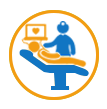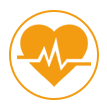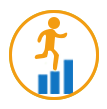Suman’s Recovery From Accident
Mr. Srinath talks about his brother’s (Suman) recovery from a grievous accident suffered in March 2018. Suman was rushed to Apollo Reach Hospital, Karimnagar, for treatment, but the impact had robbed him of his consciousness and exhibited limited physical abilities. He further underwent tracheostomy to normalize his breathing and was subsequently referred by the attending doctors to ApoKOS Rehabilitation to reinstate his motor and cognitive skills. Under the supervision of doctor K S Reddy at ApoKOS, Suman went from being completely bedridden and unable to breathe, to breathing and eating normally all over again. Mr. Srinath expresses his gratitude and admiration towards the doctors, therapists and support staff at ApoKOS for being instrumental in Suman’s miraculous recovery.
PATIENT DETAILS
The word ‘trauma’, in medicine, refers to an intense physical injury capable of inflicting injury or harm. Therefore, Traumatic Brain Injury (abbreviated as TBI) is regarded as a sudden jolt or external force exerted on to the skull resulting in distortion of the brain’s regular anatomy. It’s also known as Intracranial Injury and presents itself with a wide range of cognitive and physical impairments.
Depending on the severity of the affliction, it can be categorized into 3 distinctive heads:
- Mild TBI
- Moderate TBI
- Severe TBI
Brain is the most important organ of human nervous system constituting of 100 billion nerves communicating in over trillions of connections (synapses) that governs innumerable body functions, enabling us to function efficiently in our daily lives.
Traumatic brain injury, depending on the magnitude of the impact perceived by the patient, impedes a wide range of brain functions. The symptoms of TBI can, therefore, be studied at several levels. Some of the most primary symptoms are as follows:
- Cognitive: Amnesia, inability to speak or understand language, mental confusion, difficulty concentrating
- Behavioural: abnormal laughing and crying, aggression, impulsivity, irritability, lack of restraint
- Muscular: instability or stiff muscles
- Speech: Difficulty speaking or slurred speech
Injuries to the brain must be subjected to immediate medical care to avoid fatal consequences. Upon preliminary investigation concerning how the injury was sustained and patient’s state of alertness post trauma, the physician is to suggest the possible route of treatment. During this phase, the patient is observed in an intensive care unit to stabilize their blood pressure, ensure no further injuries are sustained to the head and neck region and prevent bleeding. TBI patients are made to undergo imaging tests like CT Scan and MRI upon arrival at the hospital, and on proper evaluation of the extent of trauma, they are either scheduled for surgeries or are given proper medication. Delayed medical care in the wake of a traumatic brain injury may result in permanent disabilities, and in worst cases, can lead to death.
In mild TBI, patients are generally administered with analgesic medications and advised to rest at home. However, in cases where the patient has suffered a fracture in the skull or has been detected with internal haemorrhages where there lies a risk of permanent damage to brain tissues, immediate surgeries are performed to dissolves hematomas and restore normal intracranial pressure and oxygen supply.
Typically, the post-acute care phase begins after the patient is discharged from the hospital. It’s during this time that TBI survivors require the assistance of a full-fledged rehabilitation facility to overcome from various cognitive and physical impairments that continue to linger for a long time after the treatment is completed.
In a rehabilitation facility, TBI survivors are monitored closely by trained therapists to prepare a comprehensive rehabilitation plan that best suits their needs. Their road to recovery is dutifully monitored through a variety of exercise programs and therapies designed to help regain their normal coordination and independence.
For patients recuperating from critical illnesses, rehabilitation is the ultimate ray of hope in helping them get back to the feet. Once they are released from the hospital, it’s important to enrol in a rehabilitation hospital to ensure a smooth transition back to their former lives.
At ApoKOS Rehabilitation, we’re backed by the experience of highly qualified doctors, dedicated therapists and advanced robotic facility to help patients return to their former lives in due time. The treatments offered to the patients during rehabilitation are as follows:
- Physical Therapy
- Occupational Therapy
- Speech and Swallow Therapy
- Robotics Technology
- Cognitive and Behaviour Therapy
- Bladder and Bowel Training
Physical Therapy
This is also known as rehab physiotherapy. It involves traditional rehabilitation methods along with cutting edge therapeutic approaches such as Manual Therapy, Geriatric Rehabilitation, Paediatric Rehabilitation, Cardio-pulmonary Rehabilitation, Robotics Technology, Neuromuscular Re-education Techniques, and Neuromuscular Pain Management with Electrotherapeutic Therapy. It comprises of a wide range of physical exercises that aims at regaining strength, balance and independence.
Occupational Therapy
This therapy aims at promoting health and wellbeing through regular conduction of occupational activities. The patient is given simple tasks to perform, to gradually regain their ability to function independently. Occupational therapy entails:
- Customised assessment of the current situation
- Intervention to ensure that the patients achieve the goals identified by the therapist
- Regular evaluation to keep track of the progress made by the patient
Speech and Swallow Therapy
This therapy is conducted by speech-language pathologists and is aimed at revival of the patient’s speech, understanding, voice coordination, and swallowing patterns. This therapy involves:
- Language therapy
- Non-vocal communication therapy
- Swallowing therapy and training
- Voice training
- Speech impairment
- Fluency development
- Cognitive training for understanding communicative patterns
Robotic Technology
To ensure proper rehabilitation, it is vital to conduct processes with the support of modern robotic technology that helps the patient regain balance and mobility. At ApoKOS, we deploy
- EKSO: This is a wearable suit that boosts strength, stamina, and mobility. EKSO is used to assist standing and gait training.
- ERIGO: This instrument is also used to assist standing, but for a more severely impaired and bed-ridden patient. ERIGO entails gradual ‘verticalization’ of the body with the support of passive robotic mobilisation.
- ARMEO POWER: ARMEO helps the patient gradually move their limbs and regain ability to function as independently as possible.
- BALANCE MASTER: This instrument helps the patient stand up and train to develop a balanced posture. With this, the patient can gradually re-learn to walk and move around.
Cognitive and Behaviour Therapy
Surviving stroke leads to side effects like loss of cognitive abilities, mood swings, anxiety, and inability to interact with other people. Cognitive and behaviour therapy is a psychosocial method used to rectify these disorders amongst patients.
The method involves:
- Psychosocial assessment of the patient by a physician
- Skill acquisition of the patient, identified by the therapist
- Application training that requires the patient to exercise their behavioural skills
- Stress reduction procedures
- Cognitive processing therapy
- Relaxation training
- Dialectical behaviour therapy
Bladder and Bowel Training
Life after stroke can be extremely testing with patients being entirely dependent on their caretakers for simple day-to-day activities. Not only does that severely wound their morale, but also make it extremely difficult for their family members to tend to them.
At ApoKOS Rehabilitation, we take special care in training the patients to perform independent, clean and intermittent CIC catheterization, thereby enabling them to lead a life of dignity and with freedom. We also specialize in providing tube feeding care and tracheostomy care.
Traumatic brain injury can be a life altering experience in many ways, and despite complete recovery it’s important to lead a cautious and protected life to evade all chances of a future trauma. At ApoKOS, our team of therapists not only guide patients towards recovery through rehabilitative practices, but also educate them on lifestyle practices and precautionary measures to adhere by in the long run.
Ensure Road Safety – Road accidents are the leading cause of traumatic brain injuries worldwide. It’s by following basic safety practices enlisted below, it’s possible to safeguard your life from unfortunate mishaps.
- Fasten seat belts while driving
- Wear helmets while riding a two-wheeler
- Never drive after consuming alcohol
Prevent Falls – Being conscious about your surroundings is highly instrumental in ensuring personal safety. Whether or not you’d suffered a TBI before, the following precautionary measures should be allowed by one and all.
- Install handrails in bathrooms and along staircases
- Install brighter lights in precarious places like washroom and corridors for enhanced visibility
- Anti-skid floorings can provide an extra edge of safety
Comprehensive Neuro treatment
Throughout the patient’s stay at our facility, our trained nurses take care of the medical needs of the patient. They also ensure that the treatment continues as per plan by coordinating with the various team members and through regular feedback from the patient and family.
Our neurological rehabilitation program offers seven salient features

Comprehensive
We aim at physical, psychological, cognitive, cultural and social aspects of the patients’ personalities, their stage of recovery and their own and their family’s lifestyle.


Patient-centric
We customize our healthcare strategies according to the patients and their families for the patient is at the centre of our entire rehabilitation process


Integrated
We design and follow a multidisciplinary approach which includes expert and motivated care personnels experienced in working in a team structure.


Inclusive
We believe in the power of family support for the patient’s optimum rehabilitation so we encourage the family’s active participation and cooperation in the recovery process.


Empowering
We want our patients to be as independent as possible so we try to empower them and build their confidence by reducing increased dependence on mobility aids.


Continuous
We provide all possible human and material resources to tackle each and every problem of the patient as and when they arise to help them achieve the highest level of recovery and independence.



Committed
We know that a patient needing neurological rehabilitation might develop several new complications with age, so we offer out-patient rehabilitation to keep track of their life-long progress.


